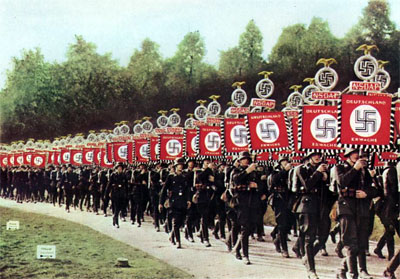Samantha Jones looks at the Nuremberg Trials in a modern context. These trials took place in the aftermath of World War II and sought to condemn those Nazis who had committed some of the most heinous crimes in the history of the world.

A Nazi parade.
Politics tells us justice is blind, and that it is justice that is fundamentally right in our society. Yet history shows us this may not be true. In the aftermath of World War II, the Western world’s form of justice was put to the test. And looking back we are troubled with the question: did democracy fail?
As Nazi leaders were confronted with their crimes against humanity in front of an international military tribunal, the entire world learned the truth behind The Final Solution, Concentration Camps, medical experiments, and the extent of Nazi genocide. These war crimes shined a spotlight onto a new and modern form of warfare, where civilians became targets and war no longer had to be declared upon a country to invade it. It was no easy feat to punish the Nazis, as the victorious Allied Powers had to question and convict those they had caught, as well as deter future nationalists from committing such crimes again. But that is what the Nuremberg Trials attempted to do.
It is said the infamous Nuremberg Trials marked the end of the Third Reich and Hitler’s Nazi Empire. Indeed, despite the Soviet Army storming Berlin, Nazi uprisings were still a threat to the triumphant Allies. So it was decided that to ‘clean up’ Europe legally and politically, the Allies were to hold a series of trials in order to fully understand and punish Nazi criminals in a democratic setting. The trials were held from November 20 1945 to October 1 1946, in the German city of Nuremberg. This site was chosen because of the somewhat intact Palace of Justice, a suitable building for the event, and the symbolism attached to Nuremberg, after the passing of the Nuremberg Laws against the Jews in 1935.
One prosecutor, one judge and one alternative judge from the Allied Powers oversaw the trial. Those that were caught included 23 high ranking Nazi officials, including the notorious Goering, Speer and Hess. Of course the highest Nazis such as Hitler, Himmler and Goebbels were not present, as they had escaped punishment through suicide before capture.
But as the news of the devastation of the war in Europe spread to the corners of the globe, interest and attraction into the Nazis grew enormously. Because of this, the Nuremberg Trials were filmed and covered by the global media, something that was to follow in other major world events.
HOW MIGHT THE TRAILS BE DIFFERENT TODAY?
The Nuremberg Trials are a small sliver of history, particularly among the World War Two era, yet this event marks the beginning of several major practices and institutions. For example, the power and dominance of democracy, the involvement of the media, and the use of knowledge and education as a deterrent were present during the Nuremberg Trials. However, looking back, would the trails be undertaken differently today?
One theme that needs to be addressed is the arguable leniency upon the Nazi prisoners. For example, even today it is debated whether it was unjust that Albert Speer, Hitler’s architect, was sentenced to merely twenty years in prison and lived the rest of his life a free man. Despite being sentenced to death, Hermann Goering, Hitler’s successor, escaped justice by committing suicide in his cell. It remains a mystery how this was able to happen. And Rudolf Hess, Hitler`s Deputy Fuhrer, was sentenced to prison where he too committed suicide. Discussing these awful things in such a dismissive tone is not my intention. But remember the graphic pictures of the Holocaust victims and the Concentration Camps that still stand today because of these men. Just under half of those charged at Nuremberg were sentenced to death, yet it was these Nazi men that were committed to gassing, killing and removing an entire people from the face of the earth. Perhaps justice was not served, but nor was revenge.
Aside from this somewhat macabre observation, the Nuremberg Trials did make advances. The organization of evidence and the methods used to explain the Nazi occupation helped the world to understand what actually happened. The Trials also contributed to the development of international legal institutions that attempt to seek justice in global crimes, such as the United Nations and the Genocide Convention. Of course it is debated whether these institutions are successful, yet the message they stand for began in Nuremberg.
History has and will repeat itself though. Crimes against humanity have been committed on an unimaginable scale quite recently, as seen in Rwanda and with Pol Pot’s Khmer Rouge. Unfortunately, with these events in mind, it is hard to argue whether or not justice can remain democratic or if can it be transformed into a form of revenge.
It is easy for our generation to look back upon Nuremberg and judge those in charge for their leniency or their harshness. But equally, as time pushes the deep dark crimes of the Nazis further back into history, I wonder how future generations will judge us on what we do. Perhaps justice will be served then.
You can read about how the radical Freikorps were one of the pre-cursors to the Nazis in issue 3 of History is Now Magazine. The magazine is available for iPad and iPhone and is free for at least one month when you try the magazine on a subscription. Click here for more information!
